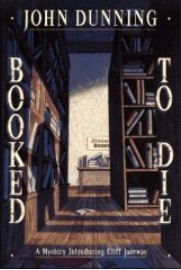The Bookseller as Anti-Hero
- by Renee Roberts

John Dunning, Booked to Die. NY: Scribner, 1992
Renee Magriel Roberts
It's summertime and it's hot and I'm looking for a quick read. The only things getting cooled around here are the books in my warehouse. I've got to get my mind off the K2 pile of books, still un-vetted, piling up in the book barn, no doubt with some choice editions diabolically buried within the detritus. So, for the first time, I order a John Dunning out of Amazon, Booked to Die (NY: Scribner, 1992). Seems like a perfect combination to me: a mystery with a bookseller/ex-cop hero. Might even learn a few things about books while I'm letting my higher faculties go blah in the night. I've come to realize, as a long-time customer of fine book establishments, that there is a dark underbelly to the business. I kind of "got it" during some early trips to library book sales, when I observed the unmistakable angst/frothing at the mouth of buyers who were clearly not there to languidly browse. The same narrowness of the eyes, the same pawing of the pavement, was no doubt present in the early land rushes. In my darker moments I imagine that booksellers and book scouts regularly show up at wakes and funerals and occasionally meet at bookseller conventions where, looking an awful lot like vultures, they solicitously enquire after each other's health.
Remember "The Ninth Gate" with Johnny Depp as a rare book dealer, Dean Corso, and Frank Langella as the evil Boris Balkan? Balkan hires Corso to seek copies of a very rare book supposedly written by Satan himself (yes, even Satan aspires to be a bestselling author). As Corso follows the various clues to the puzzle in the copies of the books he finds, people die all around him, a process that seems to go hand-in-hand with rare book acquisition. (I'm sure there is a "Six Feet under the Bookstore" in the works, ready to be produced as an HBO series about a combination bookstore/funeral home business which not only makes money from the families of the dead, but has right of first refusal on their libraries.) There is a short, but particularly memorable scene at the beginning of "The Ninth Gate", when Corso arrives at the home of a recent decedent, feigns interest in some books that he will appraise at a future time, and then nonchalantly scoops up a rare Don Quixote for next to nothing when he is walking out the door. Business as usual in the rare book business.
But, I digress. So it's like 95 in the shade on Cape Cod, and without a proper way to put my feet up, the warehouse is getting pretty uncomfortable as a permanent nesting spot, so I'm back in my un-air conditioned living room, Booked to Die in hand. Cliff Janeway, the bookseller/ex-cop anti-hero introduced in this novel, is multi-tasking - simultaneously trying to protect an abused female from being further beaten by her gangster boyfriend while running a ratty bookstore in one of Denver's less attractive venues. And oh yes, he is also trying to figure out why another character, an unattractive book scout (Bobby Westfall) who was living from book pile to book pile, has turned up murdered. Janeway, an admitted book fiend, is also trying to figure out what rare book or books may have contributed to Bobby's end.